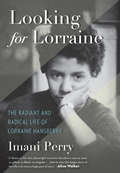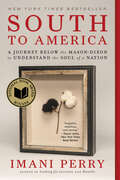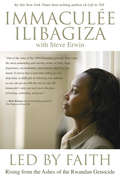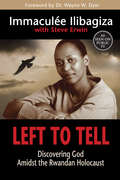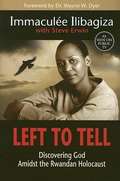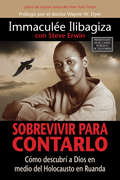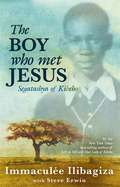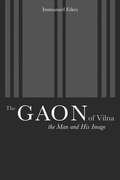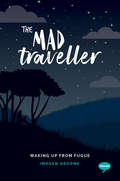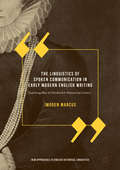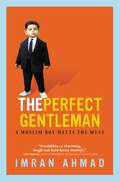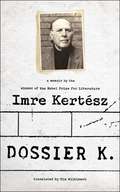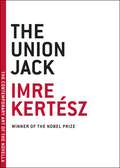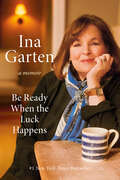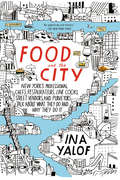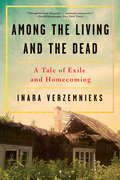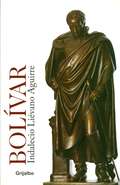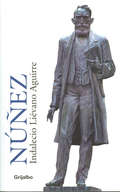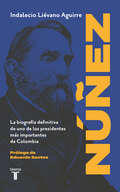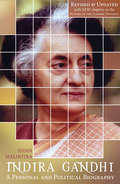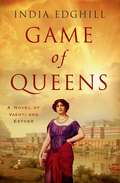- Table View
- List View
Looking for Lorraine: The Radiant and Radical Life of Lorraine Hansberry
by Imani PerryA revealing portrait of one of the most gifted and charismatic, yet least understood, Black artists and intellectuals of the twentieth century. <p><p> Lorraine Hansberry, who died at thirty-four, was by all accounts a force of nature. Although best-known for her work A Raisin in the Sun, her short life was full of extraordinary experiences and achievements, and she had an unflinching commitment to social justice, which brought her under FBI surveillance when she was barely in her twenties. While her close friends and contemporaries, like James Baldwin and Nina Simone, have been rightly celebrated, her story has been diminished and relegated to one work—until now. <p> In 2018, Hansberry will get the recognition she deserves with the PBS American Masters documentary “Lorraine Hansberry: Sighted Eyes/Feeling Heart” and Imani Perry’s multi-dimensional, illuminating biography, Looking for Lorraine. <p> After the success of A Raisin in the Sun, Hansberry used her prominence in myriad ways: challenging President Kennedy and his brother to take bolder stances on Civil Rights, supporting African anti-colonial leaders, and confronting the romantic racism of the Beat poets and Village hipsters. Though she married a man, she identified as lesbian and, risking censure and the prospect of being outed, joined one of the nation’s first lesbian organizations. Hansberry associated with many activists, writers, and musicians, including Malcolm X, Langston Hughes, Duke Ellington, Paul Robeson, W.E.B. Du Bois, among others. <p> Looking for Lorraine is a powerful insight into Hansberry’s extraordinary life—a life that was tragically cut far too short.
South to America: A Journey Below the Mason-Dixon to Understand the Soul of a Nation
by Imani PerryA Most Anticipated Book From: The New York Times • TIME • Oprah Daily • Vulture • Essence • Esquire • W Magazine • Atlanta Journal-Constitution • PopSugar • Book Riot • Chicago Review of Books • Electric Literature • Lit Hub. <p><p> An essential, surprising journey through the history, rituals, and landscapes of the American South—and a revelatory argument for why you must understand the South in order to understand America. <p><p> We all think we know the South. Even those who have never lived there can rattle off a list of signifiers: the Civil War, Gone with the Wind, the Ku Klux Klan, plantations, football, Jim Crow, slavery. But the idiosyncrasies, dispositions, and habits of the region are stranger and more complex than much of the country tends to acknowledge. In South to America, Imani Perry shows that the meaning of American is inextricably linked with the South, and that our understanding of its history and culture is the key to understanding the nation as a whole. <p><p> This is the story of a Black woman and native Alabaman returning to the region she has always called home and considering it with fresh eyes. Her journey is full of detours, deep dives, and surprising encounters with places and people. She renders Southerners from all walks of life with sensitivity and honesty, sharing her thoughts about a troubling history and the ritual humiliations and joys that characterize so much of Southern life. <p><p> Weaving together stories of immigrant communities, contemporary artists, exploitative opportunists, enslaved peoples, unsung heroes, her own ancestors, and her lived experiences, Imani Perry crafts a tapestry unlike any other. With uncommon insight and breathtaking clarity, South to America offers an assertion that if we want to build a more humane future for the United States, we must center our concern below the Mason-Dixon Line.
Led by Faith: Rising from the Ashes of the Rwandan Genocide
by Immaculee IlibagizaFor three months in the spring of 1994, the African nation of Rwanda descended into one of the most vicious and bloody genocides the world has ever seen. Immaculée Ilibagiza, a young university student, miraculously survived the savage killing spree that left most of her family, friends, and a million of her fellow citizens dead. Her remarkable story of survival was documented in her first book, Left to Tell: Discovering God Amidst the Rwandan Holocaust. In Led By Faith, Immaculée takes us with her as her remarkable journey continues. Through her simple and eloquent voice, we experience her hardships and heartache as she struggles to survive and to find meaning and purpose in the aftermath of the holocaust. It is the story of a naïve and vulnerable young woman, orphaned and alone, navigating through a bleak and dangerously hostile world with only an abiding faith in God to guide and protect her. Immaculée fends off sinister new predators, seeks out and comforts scores of children orphaned by the genocide, and searches for love and companionship in a land where hatred still flourishes. Then, fearing again for her safety as Rwanda&’s war-crime trials begin, Immaculée flees to America to begin a new chapter of her life as a refugee and immigrant—a stranger in a strange land. With the same courage and faith in God that led her through the darkness of genocide, Immaculée discovers a new life that was beyond her wildest dreams as a small girl in a tiny village in one of Africa&’s poorest countries. It is in the United States, her adopted country, where Immaculée can finally look back at all that has happened to her and truly understand why God spared her life . . . so that she would be left to tell her story to the world.
Left to Tell
by Immaculee Ilibagiza Steve ErwinA powerful story of faith, perseverance, and hope in Rwanda.
Left to Tell: Discovering God Amidst The Rwandan Holocaust
by Immaculee IlibagizaThe remarkable New York Times bestseller has been updated with a new Afterword by Immaculée, in which she looks back at the 20 years that have passed since the Rwandan holocaust. You won’t want to miss her views on how life has changed for her and her country since this terrible event took place.
Left to Tell: Discovering God Amidst the Rwandan Holocaust
by Immaculee Ilibagiza Steve ErwinThe triumphant story of a remarkable woman's journey through the darkness of genocide will inspire anyone whose life has been touched by fear, suffering, and loss.
Sobrevivir Para Contarlo
by Immaculee IlibagizaUna parte de las utilidades recaudadas por la venta de este libro será destinada a la Fundación Benéfica de SOBREVIVIR PARA CONTARLO, la cual ayuda a los niños de África a llevar una mejor vida. Por favor vaya a la página___ para información sobre pedidos del brazalete LEFT TO TELL. Todo el dinero recaudado por la venta de los brazaletes será destinado a la Fundación Benéfica.
The Boy Who Met Jesus: Segatashya of Kibeho
by Steve Erwin Immaculée IlibagizaIt's the greatest story never told: that of a boy who met Jesus and dared to ask him all the questions that have consumed mankind since the dawn of time. No matter what one's faith or religious beliefs are, Segatashya's words will bring comfort and joy.
The Gaon of Vilna: The Man and His Image
by Immanuel EtkesThe Gaon of Vilna (Rabbi Elijah ben Soloman Zalman, 1720-1797) is considered by many one of the leading intellectual and spiritual leaders of Talmudic study in the 18th century. This book is about him.
The Mad Traveller: Waking up from Fugue (Inspirational Series)
by Imogen GroomeHow terrifying is it when you disappear from your everyday life and wake up somewhere else, without even knowing how you got there? That is the experience of someone with dissociative fugue – and that was the life Imogen Groome lived. A clever and quiet child, Imogen was marginalised and bullied at school. Sometimes she walked out of lessons, because she simply couldn’t cope; sometimes, something inside her woke up, and “The Mad Traveller” took over.Imogen was the girl who kept going missing. And as she struggled to deal with a life that just kept on getting harder, she zoned out more and more. But even when she found herself homeless in London, abused by the people she trusted, and forced to endure a life of compromise, Imogen never lost her faith in her ability to recover.The Mad Traveller is a very relatable story for anyone who has ever found themselves marginalised, alone or afraid. At its heart, this is a story for anyone who has ever dared to dream big.
The Linguistics of Spoken Communication in Early Modern English Writing: Exploring Bess Of Hardwick's Manuscript Letters (New Approaches To English Historical Linguistics Ser.)
by Imogen MarcusThis book uses a corpus of manuscript letters from Bess of Hardwick to investigate how linguistic features characteristic of spoken communication function within early modern epistolary prose. Using these letters as a primary data source with reference to other epistolary materials from the early modern period (1500-1750), the author examines them in a unique and systematic way. The book is the first of its kind to combine a replicable scribal profiling technique, used to identify holograph and scribal handwriting within the letters, with innovative analyses of the language they contain. Furthermore, by adopting a discourse-analytic approach to the language and making reference to the socio-historical context of language use, the book provides an alternative perspective to the one often presented in traditional historical accounts of English. This volume will appeal to students and scholars of early modern English and historical linguistics.
The Perfect Gentleman
by Imran AhmadBoth deliciously funny and deeply insightful, THE PERFECT GENTLEMAN is a beguiling multi-layered memoir that has touched the hearts of readers all over the world. At the age of one, Imran Ahmad moved from Pakistan to London, growing up torn between his Islamic identity and his desire to embrace the West. Join Imran in his lifelong struggle against corruption and injustice, and as he grapples with some of Life's most profound questions. What does God do exactly? Do you automatically go to Hell for following the wrong religion? How do you persuade a beautiful woman to become your girlfriend (and would driving a Jaguar XJS help?) Can you maintain a James Bond persona without the vodka, cigarettes and women - even whilst your parents are trying to arrange your marriage? Imran's unimagined journey makes thoughtful, compelling, and downright delightful reading. With a unique style and unflinching honesty, THE PERFECT GENTLEMAN addresses serious issues in an extraordinarily light way, and will leave readers both thinking deeply and laughing out loud.
Dossier K: A Memoir
by Tim Wilkinson Imre KerteszThe first and only memoir from the Nobel Prize-winning author, in the form of an illuminating, often funny, and often combative interview--conducted by the author of himself. Dossier K is Imre Kertész's response to the hasty biographies and profiles that followed his 2002 Nobel Prize, an attempt to set the record straight. But, as befits Kertész, it's a beautifully roundabout way of going straight: Kertész faces and interrogates himself about the issues and events that have long preoccupied him, while also dealing with the questions that really annoy him (such as, "Is your work autobiographical?"). The result is an extraordinary self-portrait, in which Kertész recounts memories of his childhood in Budapest; the years that lead up to the Second World War and his first encounters with anti-Semitism; the incredible forged record of his death in Buchenwald that may in fact have saved his life; his release from the camps and his return to his family; Hungary's Rákosi and Kádár regimes and the terror, hypocrisy, and absurdity they entailed; his thoughts about what other writers have written about the Holocaust; his two marriages; and his long development as a writer. This is a surprising and provocative autobiography that delves into questions about the legacy of the Holocaust, fiction and reality, and what Kertész calls "the wonderful burden of being responsible for yourself.
The Union Jack
by Tim Wilkinson Imre Kertesz"It was...unnecessary for me to fret about who the murderer was: Everybody was."A haunting, never-before-translated, autobiographical novella by the 2002 Nobel Prize winner. An unnamed narrator recounts a simple anecdote, his sighting of the Union Jack--the British Flag--during the Hungarian Revolution of 1956, in the few days preceding the uprising's brutal repression by the Soviet army. In the telling, partly a digressive meditation on "the absurd order of chance," he recalls his youthful self, and the epiphanies of his intellectual and spiritual awakening--an awakening to a kind of radical subjectivity. In his Nobel address Kertesz remembered: "I, on a lovely spring day in 1955, suddenly came to the realization that there exists only one reality, and that is me, my own life, this fragile gift bestowed for an uncertain time, which had been seized, expropriated by alien forces, and circumscribed, marked up, branded--and which I had to take back from 'History', this dreadful Moloch, because it was mine and mine alone..."The Contemporary Art of the Novella series is designed to highlight work by major authors from around the world. In most instances, as with Imre Kertész, it showcases work never before published; in others, books are reprised that should never have gone out of print. It is intended that the series feature many well-known authors and some exciting new discoveries. And as with the original series, The Art of the Novella, each book is a beautifully packaged and inexpensive volume meant to celebrate the form and its practitioners.
Hilton Bombing: Evan Pederick and the Ananda Marga
by Imre SalusinszkyIn 1978, Evan Pederick, a naive 22-year-old in the thrall of a radical religious movement, Ananda Marga, placed an enormous bomb outside Sydney's Hilton Hotel. It killed three people. A decade later, Pederick confessed to this act of terrorism. But when one of his alleged accomplices was later acquitted, significant parts of Pederick's testimony were undermined and he was accused of being a 'fantasist'. Conspiracy theories flooded in to fill the vacuum. Was it a plot by ASIO, rather than, as Pederick asserted, a plot to assassinate the Indian prime minister? In the absence of a Royal Commission or similar inquiry, mystery continues to shroud the deadliest terror attack on Australian soil. Pederick, an Anglican priest, stands by his confession and testimony. Here is his story, told for the first time. It is an extraordinary tale of guilt, remorse, renewal, and the search for forgiveness.
Be Ready When the Luck Happens: A Memoir
by Ina Garten#1 NEW YORK TIMES BESTSELLER • In her long-awaited memoir, Ina Garten—aka the Barefoot Contessa, author of thirteen bestselling cookbooks, beloved Food Network personality, Instagram sensation, and cultural icon—shares her personal story with readers hungry for a seat at her table. A BEST BOOK OF THE YEAR: The New York Times Book Review, Time, The New Yorker, Vanity Fair, Town & CountryHere, for the first time, Ina Garten presents an intimate, entertaining, and inspiring account of her remarkable journey. Ina&’s gift is to make everything look easy, yet all her accomplishments have been the result of hard work, audacious choices, and exquisite attention to detail. In her unmistakable voice (no one tells a story like Ina), she brings her past and her process to life in a high-spirited and no-holds-barred memoir that chronicles decades of personal challenges, adventures (and misadventures) and unexpected career twists, all delivered with her signature combination of playfulness and purpose. From a difficult childhood to meeting the love of her life, Jeffrey, and marrying him while still in college, from a boring bureaucratic job in Washington, D.C., to answering an ad for a specialty food store in the Hamptons, from the owner of one Barefoot Contessa shop to author of bestselling cookbooks and celebrated television host, Ina has blazed her own trail and, in the meantime, taught millions of people how to cook and entertain. Now, she invites them to come closer to experience her story in vivid detail and to share the important life lessons she learned along the way: do what you love because if you love it you&’ll be really good at it, swing for the fences, and always Be Ready When the Luck Happens.
Food and the City: New York's Professional Chefs, Restaurateurs, Line Cooks, Street Vendors, and Purveyors Talk About What They Do and Why They Do It
by Ina YalofAn unprecedented behind-the-scenes tour of New York City's dynamic food culture, as told through the voices of the chefs, line cooks, restaurateurs, waiters, and street vendors who have made this industry their lives. In Food and the City, Ina Yalof takes us on an insider's journey into New York's pulsating food scene alongside the men and women who call it home. Dominique Ansel declares what great good fortune led him to make the first cronut. Lenny Berk explains why Woody Allen's mother would allow only him to slice her lox at Zabar's. Ghaya Oliveira, who came to New York as a young Tunisian stockbroker, opens up about her hardscrabble yet swift trajectory from dishwasher to executive pastry chef at Daniel. Restaurateur Eddie Schoenfeld describes his journey from Nice Jewish Boy from Brooklyn to New York's Indisputable Chinese Food Maven.From old-schoolers such as David Fox, third-generation owner of Fox's U-bet syrup, and the outspoken Upper West Side butcher "Schatzie," to new kids on the block including Patrick Collins, sous chef at The Dutch, and Brooklyn artisan Lauren Clark of Sucre Mort Pralines, Food and the City is a fascinating oral history with an unforgettable gallery of New Yorkers who embody the heart and soul of a culinary metropolis.From the Hardcover edition.
Among the Living and the Dead: A Tale Of Exile And Homecoming On The War Roads Of Europe
by Inara Verzemnieks“Extraordinarily tender and finely wrought.” — Eliza Griswold, author of The Tenth Parallel “It’s long been assumed of the region where my grandmother was born…that at some point each year the dead will come home,” Inara Verzemnieks writes in this exquisite story of war, exile, and reconnection. Her grandmother’s stories recalled one true home: the family farm left behind in Latvia, where, during WWII, her grandmother Livija and her grandmother’s sister, Ausma, were separated. They would not see each other again for more than 50 years. Raised by her grandparents in Washington State, Inara grew up among expatriates, scattering smuggled Latvian sand over the coffins of the dead, singing folk songs about a land she had never visited. When Inara discovers the scarf Livija wore when she left home, in a box of her grandmother’s belongings, this tangible remnant of the past points the way back to the remote village where her family broke apart. There it is said the suspend their exile once a year for a pilgrimage through forests and fields to the homes they left behind. Coming to know Ausma and the trauma of her exile to Siberia under Stalin, Inara pieces together Livija’s survival through years as a refugee. Weaving these two parts of the family story together in spellbinding, lyrical prose, she gives us a profound and cathartic account of loss, survival, resilience, and love.
Jewish Radical Ultra-Orthodoxy Confronts Modernity, Zionism and Women’s Equality
by Motti Inbari Inbari, Motti and Vardi, Shaul Shaul VardiIn Jewish Radical Ultra-Orthodoxy Confronts Modernity, Zionism and Women's Equality, Motti Inbari undertakes a study of the culture and leadership of Jewish radical ultra-Orthodoxy in Hungary, Jerusalem and New York. He reviews the history, ideology and gender relations of prominent ultra-Orthodox leaders Amram Blau (1894–1974), founder of the anti-Zionist Jerusalemite Neturei Karta, and Yoel Teitelbaum (1887–1979), head of the Satmar Hasidic movement in New York. Focussing on the rabbis' biographies, the author analyzes their enclave building methods, their attitude to women and modesty, and their eschatological perspectives. The research is based on newly discovered archival materials, covering many unique and remarkable findings. The author concludes with a discussion of contemporary trends in Jewish religious radicalization. Inbari highlights the resilience of the current generations' sense of community cohesion and their capacity to adapt and overcome challenges such as rehabilitation into potentially hostile secular societies.
Bolívar
by Indalecio Liévano AguirreLa más completa biografía del gran Libertador en las letras de uno delos mejores escritores de historia en Colombia. Atesorado como la mejor biografía del Libertador jamás escrita #y ya soninumerables-, este libro nos invita a mirar de cerca la intensa vida deun hombre excepcional, a la vez soldado, político, escritor, legisladory humanista. Sus épicas batallas, sus ideales, sus tormentosos romances,sus formidables enemigos y sus escasos amigos, su pensamiento, todo estáaquí narrado con impecable maestría. #La esclavitud es hija de las tinieblas, un pueblo ignorante es elinstrumento ciego de su propia destrucción
Rafael Núñez
by Indalecio Liévano AguirreLa biografía más completa de uno de los presidentes más importantes delsiglo XIX y que habría de cambiar para siempre la historia de Colombia. La biografía de Rafael Núñez de Indalecio Liévano Aguirre #no se limitaa los documentos oficiales y a los hechos públicos que van marcando laevolución del estadista (#) sino que se detiene, con la más inteligenteperspicacia, en las características psicológicas del hombre (#) en suspasiones, en los vendavales de su vida privada, en la manera como ibadesarrollándose un alma tormentosa que se orientaba tanto por la ideaspolíticas como por los sentimientos íntimos. (El libro) es unainvitación a jugar juzgar los hechos del siglo XIX con un severocriterio de análisis y no con la superficial pasión retórica de tipopolítico. Es una interpretación inteligente y singularmente atractiva deuna de las personalidades más vigorosas de la historia de América, quedebe estar más allá de la diatriba y del elogio interesado. EduardoSantos.
Rafael Núñez: La biografía definitiva de uno de los presidentes más importantes de colombia
by Indalecio Liévano AguirreLa biografía más completa del presidente Rafael Núñez "Muchas veces se ha querido juzgar al poeta con criterio meramente retórico, cuando la verdad es que en Núñez el poeta, el hombre privado y el hombre público están indisolublemente ligados .Así lo comprendió Liévano Aguirre y ese, para mí, es el mejor acierto literario y psicológico de su obra. Con certero instinto vio dónde estaba la mejor clave de interpretación de la personalidad del doctor Núñez y nos presenta en su biografía una figura profundamente humana, alimentada siempre por fuertes e implacables pasiones, por un cálido sentido de la vida, por rencores, venganzas, ambiciones y sensualidades que ejercían influjo decisivo sobre lo que pudiera considerarse como mera orientación política. La fría enumeración de las actividades públicas de Núñez y de la manera como ellas modificaron la vida colombiana no podría jamás explicarnos por sí sola la personalidad del padre de la Regeneración. Se equivocan, a mi modo de ver, quienes quisieran ver en él tan solo a un doctrinario, a un pensador político, a un organizador de las instituciones. Podría ser todo eso pero era además una pasión en marcha, una pasión humana, influida decisivamente por todas las cosas grandes y pequeñas que afectan la vida de los hombres". Eduardo Santos
Indira Gandhi: A Personal and Political Biography
by Inder MalhotraA definitive, incisive and no-holds-barred account of the life and times of one of India’s most charismatic and prominent leaders who has left a distinctive stamp on history For almost two decades, Indira Gandhi stood out the world’s most powerful woman. In India, there is hardly a neutral opinion about her. She is either adored or abused. Inder Malhotra’s biography explores objectively this highly complex and very private person – right from her childhood to her last days – who lived under constant public gaze and learnt to adjust her demanour to the occasion, rigorously concealing her true self and real feelings. This comprehensive work recounts her unusual and unhappy ‘love marriage’ to Feroze Gandhi and examines the ambivalent influence of her father, Jawaharlal Nehru, on her career. It also focuses on her relationship with her sons: Sanjay, her chosen heir, and his elder brother Rajiv, who, ironically, succeeded her as the prime minister of India. The author traces Indira Gandhi’s own evolution from a ‘dumb doll’ to the ‘empress of India’ and her downfall, the seeds of which were sown when she imposed the Emergency on 25 June 1975. This phase marked a dark period in the post-independence era. Her party (the Congress) lost the March 1997 general election and she was out of power for nearly three years. The author also describes the later revival in her fortunes, when she returned as prime minister in January 1980. During her second term, she had to order the Indian Army to enter the Golden Temple in Amritsar (the holiest shrine of the Sikhs) to flush out the militants hiding there. This move led to her being assassinated by her own Sikh bodyguards on 31 October 1984. In the revised and updated edition, Inder Malhotra throws light on the impact that Indira Gandhi had (and continues to have) on Indian politics after her death when her mantle fell on members of her family, including Rajiv Gandhi first and Sonia Gandhi later. This is not only a compulsive and gripping narrative about a remarkable personality but also a fascinating study of India after independence.E41
Game of Queens: A Novel of Vashti and Esther
by India EdghillFor fans of The Red Tent and The Dovekeepers, India Edghill breathes new life into the biblical story of Vashti and Esther with her signature historical richness, epic scope, and sweeping romance. <P><P> You may know part of the story already, but you only know what history has passed along. The story of how Vashti, Queen of Queens, the most beautiful woman in all the empire, defied the king her husband and so lost her crown. The story of how Ahasuerus, King of Kings, commanded that the most beautiful maidens be sent to his court so he might choose a new queen. And you may know how he set the queen's crown upon the head of the virtuous and beautiful Esther, and how Queen Esther herself defied both king and law to save her people from a treacherous fate.<P> What India Edghill brings us in Game of Queens is the story of power and treachery, blood and deception, bravery and romance that surrounds the court of Ahasuerus and brings to life two of the most celebrated female heroines in all of history.
